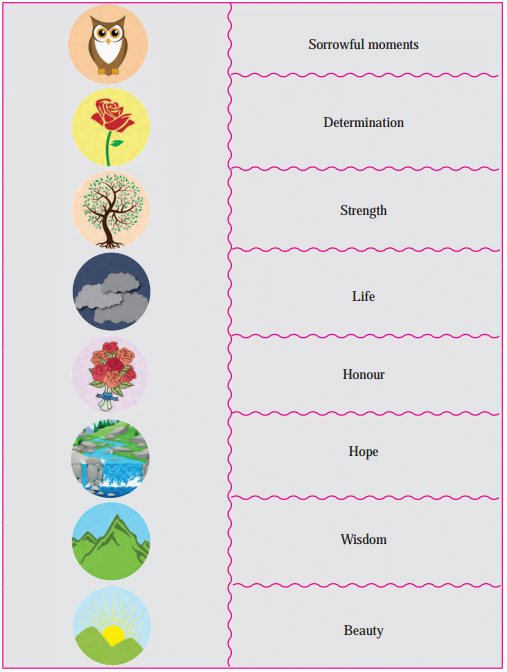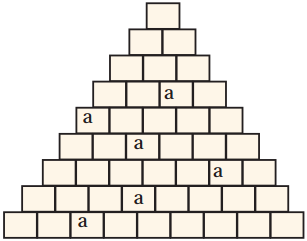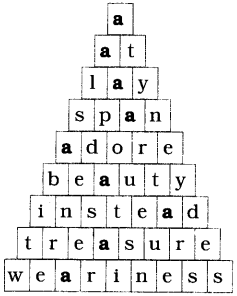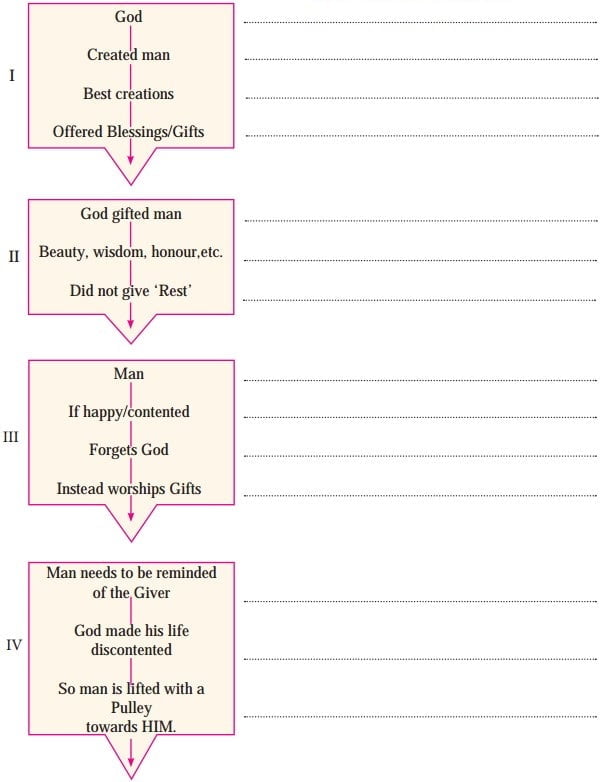Unit 2.4 The Pulley
Question 1.
Go through the following images and try to link them with our lives. For example, Storm – Hardships that we face in our life.

Answer:
For example : storms – hardships that we face in our lives
Owl – Wisdom
Rose – Life
Tree – Determination
Clouds – Sorrowful moments
Bouquet of flowers – Beauty
Waterfall – Strength
Mountains – Honour
Sunrise – Hope
Question 2.
You may have often indulged in talking to yourself audibly.
For example,
- “Oh, dear! Why didn’t I get up sooner?”
- “Let me finish this quickly and then I’ll be free”.
- “How silly of me! Why didn’t I think of it before?”
Such expressions are called Dramatic Monologues.
Imagine and write Monologues suitable in the following situations.
→ It’s your birthday next week.
…………………………………………………………….
Answer:
I wonder what presents I’ll get. I hope dad gets me the bicycle he promised
→ You have been waiting long at the city of bus-stop.
…………………………………………………………….
Answer:
Oh, bother Now I shall be late for school again.
→ Your final exam results are to be declared tomorrow.
…………………………………………………………….
Answer:
I wish it were tomorrow
→ Your mother has been chatting for very long on the telephone.
…………………………………………………………….
Answer:
This conversation could go on for ages When will I get a chance to call?
Question 3.
‘The Pulley’ is a mechanical device.
Try and write down places where it can be used, and for what purpose.
…………………………………………………………….
…………………………………………………………….
…………………………………………………………….
…………………………………………………………….
…………………………………………………………….
Answer:
– To draw water out of a well
– In elevators
– In exercise machines
– In theatres to open curtains
– To lift up heavy objects at construction sites
Question 1.
With the help of the clues, pick out words containing the letter ‘a’ from the poem and build a word-pyramid.

(a) an article
(b) a preposition
(c) past tense of ‘lie’
(d) maximum length of your open palm
(e) make much of
(f) loveliness
(g) in place of
(h) a collection of priceless valuables
(i) restlessness and discontent
Answer:

(a) an article
(b) a preposition
(c) the past tense of ‘lie’
(d) the maximum length of your open palm
(e) make much of
(f) loveliness
(g) in place of
(h) a collection of priceless articles
(i) restlessness and discontent
The Pulley Poem Question 2.
Choose the correct alternative from the following.
(a) Herbert’s poem ‘The Pulley’ displays . . . . . . . . as the two main themes.
(i) Origin of Morality/Spirituality
(ii) Origin of species
(iii) Origin of the universe/galaxy
(iv) Origin of the earth/space
Answer:
(i) Origin of Morality/Spirituality
(b) The theme of the poem ‘The Pulley’ is (Find two correct statements from the given alternatives.)
(i) to focus on the mechanical operation of a pulley.
(ii) to teach a lesson to a creation (man) by the Creator (God)
(iii) to know the different gifts bestowed on man by God.
(iv) to remind man about his creator in his exhaustion.
(v) God pulled man towards Him by making him restless and weary.
Answer:
(iv) to remind man about his Creator in his exhaustion.
(c) In the poem, ‘The Pulley’ is considered ………………….
(i) a mechanical device.
(ii) a gift to mankind
(iii) an image to lift objects.
(iv) an image by which God compels people to become devout.
Answer:
(ii) a gift to mankind.
(d) . . . . . . . . is an example of Pun from the poem.
(i) Rest in the bottom lay.
(ii) So strength first made a way.
(iii) Having a glass of blessings . . . . . .
(iv) So both should losers be
Answer:
(i) Rest in the bottom lay.
(e) . . . . . . . . is an example of Paradox from the poem.
(i) And rest in Nature, not the God of Nature.
(ii) He would adore my gifts instead of me.
(iii) Let him be rich and weary.
(iv) When God at first made man.
Answer:
(iii) Let him be rich and weary.
(f) . . . . . . is an example of Synecdoche from the poem.
(i) So both should losers be.
(ii) Then beauty flowed.
(iii) “Let us” said he “pour on him.”
(iv) May toss him to my breast.
Answer:
(iv) May toss him to my breast.
(g) . . . . . . is an example of Alliteration from the poem.
(i) made a way
(ii) bottom lay.
(iii) repining restlessness
(iv) keep the rest.
Answer:
(iii) repining restlessness
(h) . . . . . . is an example of Inversion from the poem.
(i) Contract into a span.
(ii) So both should losers be.
(iii) Bestow this jewel.
(iv) And rest in nature.
Answer:
(ii) So both should losers be.
(i) The rhyme scheme of the poem is . . . . . .
(i) a a b b c
(ii) a b c b c
(iii) a b c c b
(iv) a b a b a
Answer:
(iv) a b a b a
Pulley Poem Question 3.
Discuss and answer in your own words, and write in your notebook.
(a) The poet has used the word REST thrice in the poem. Write what the word implies in each of the three lines it occurs.
Answer:
. . . rest in nature – give importance to, enjoy the benefits of
. . . let him keep the rest – the remaining gifts (except the gift of ‘rest’)
. . . rest – contentment, satisfaction
(b) What does God want in return from man, for the gifts He has bestowed upon him?
Answer:
In return for the gifts He has bestowed on man, God wants him to lead a life of goodness and to keep on adoring the God who has been so generousto him.
(c) Why did God withhold the gift of ‘Rest’ from man?
Answer:
‘Rest’ makes us feel satisfied and contented,When we have ‘rest’, we do not desire anything more. We might even stop remembering God, our Creator, or seeking His blessings. Hence, God withheld the gift of ‘Rest’ from man.
(d) Besides those given in the poem, what other gifts has God blessed mankind with above his other creations? Enlist them.
Answer:
Besides those given in the extract, God has bestowed on mankind the ability to use language as well as other cognitive abilities like reasoning, abstract thinking, etc. Above all, He has given human beings a marvellous brain, with which man has invented millions of things, right from the wheel to the computer.
(e) When does man generally turn to God? Give one example to support your response.
Answer:
Man , generally turns to God when he is troubled or is facing some difficulty. I remember a neighbour of mine who professed to be an atheist, but when there was a stock market crash, we were all surprised to see him at our temple with hands joined and eyes closed, praying to God.
Question 4.
(A) Discuss with your group and justify the title of the poem ‘The Pulley’ in your own words.
…………………………………………………………….
…………………………………………………………….
…………………………………………………………….
…………………………………………………………….
Answer:
The pulley works when pressure is exerted on either side of the rope passing through it. If one side comes down, the other goes up. Here, the poet expresses the idea that when weariness weighs down man on one end his spiritual aspects on the other end gets an uplift. According to the poet, God deliberately withheld bestowing ‘rest’ to man so that the very ‘restlessness’ wojild bring him nearer to Him. Thus, the title ‘The Pulley’ is appropriate.
(B) Pick out 3 lines that contain Monologues of God.
…………………………………………………………….
…………………………………………………………….
…………………………………………………………….
Answer:
(1) For if I should bestow this jewel also on my creature.
(2) He would adore my gifts instead of me.
(3) If goodness lead him not, yet weariness may toss him to my breast.
Question 5.
(A) Pick out two lines that contain the following figures of speech.
(a) Antithesis
1. …………………………..
2. …………………………..
Answer:
1. Antithesis: Let the world’s riches which dispersed lie.
2. Contract into a span.
(b) Alliteration
1. …………………………..
2. …………………………..
Answer:
1. And rest in the Nature, not the God of the Nature.
2. Repetition of ‘n’ sound.
(c) Inversion
1. …………………………..
2. …………………………..
Answer:
1. Let us {said He)
2. Rest in the bottom lay.
(B) Explain the Figures of Speech in the following lines.
(a) Rest in the bottom lay-PUN because
……………………………………………………….
Answer:
It is a Pun because the word ‘rest’ has two meanings – ‘the last one remaining’ and ‘a quality that helps us stop doing something and relax’.
(b) Bestow this jewel also on my creature-METAPHOR because
……………………………………………………….
Answer:
Extended Metaphor: The simple meaning of the ‘pulley’ is extended to show an implicit comparison between the ‘gift’ of ‘rest’ that is not bestowed on man S by God, and by which he will be pulled towards God finally.
(c) And rest in nature, not the God of Nature-REPETITION because
……………………………………………………….
Answer:
Repetition: The word ‘Nature’ is repeated for emphasis.
Question 6.
Write Critical Appreciation of the poem in a paragraph format. (Refer to page no. 5)
Answer:
Point Format
(for understanding)
- Title of the poem: ‘The Pulley’
- The poet: George HerbertRhyme scheme: a-b-a-b-a
- Figures of speech: Metaphor, Pun, Inversion, Paradox, etc.
- The central idea theme the reason why man is continually restless
Paragraph Format
The title of the poem is ‘The Pulley’. The poet is George Herbert.
Each stanza of the poem has five lines. The rhyme scheme of the poem is a-b-a-b-a.
The chief figure of speech used in the poem is Metaphor. The ‘glass of blessings’ signifies the sum of all human qualities bestowed on man. The quality of ‘rest’ or ‘contentment’ is implicitly compared to a ‘jewel’. The other figures of speech are Pun, Inversion, Paradox, etc.
The central idea of the poem is the reason for man’s continual restlessness all his life. According to the poet, this is because God withheld the quality of ‘rest’ from man, so that man’s thoughts would ultimately turn towards God, his creator.
Question 7.
‘Pun’ can be defined as play on words based on their different meanings. Example ‘Writing with a broken pencil is pointless.’ In this poem there is an example of Pun. Find and make a sentence of your own. Share a joke with the class where the use of ‘Pun’ creates humour.
Answer:
(i) Rest in the bottom lay
(ii) So strength first made away.
(iii) Having a glass of blessings
(iv) So both should losers be.
Question 8.
Write a paragraph on the points in each block given below to get a summary on each of the four stanzas of the poem.

Answer:
(1) The poel says dial at the lime when God fir.si 1 created man. He had a glass of blessings standing by. He thought dial He would be generous and shower on man all the gifts possible. God intended lhal all the treasures of die earth which lay scallcred should be eollecled and concentrated in die small space He had created – which was man.
(2) The first gift God gave man was strength. This was followed by beauty, then wisdom, honour and pleasure. When nearly all the gifts had been bestowed on man. God slopped awhile. He noticed that of all the treasures, only one gill remained at Ihe bottom of the glass, and that was rest.
(3) God said to Himself that if He bestowed this precious and valuable gift on His creation, man would love anil worship only the gifts of Nature, and would not love the God who-had created all the things in Nature. Thus both God and man would end up as losers.
(4) So God let man retain all the other gifts, but at the same lime, He left man restless and continually anxious and dissatisfied, lie thought that in should be rich with the abundance of gifts, but he should always remain tired and restless. God reasoned that only then, at the end. if the quality of goodness did not lead man back to God. sheer fatigue (tiredness) would draw man back to God’s heart.
Question 9.
Choose the correct alternatives from the following:
(a) Herbert’s poem ‘The Pulley’ displays Origins and Morality/Spirituality as the two main themes.
(i) Origins and Morality/Spirituality
(ii) Origin of species
(iii) Origin of the universe galaxy
(iv) Origin of the earth space
Answer:
(i) Origins and Morality/Spirituality
(b) The first gift was strength.
(i) strength
(ii) beauty
(iii) wisdom
(iv) rest
Answer:
(i) strength
(c) The last gift left was rest.
(i) strength
(ii) beauty
(iii) wisdom
(iv) rest
Answer:
(iv) rest
(d) The gifts blessings lay in a glass.
(i) the world
(ii) a span
(iii) a glass
(iv) a pathway
Answer:
(iii) a glass
Question 10.
What did God’s glass of blessings contain?
Answer:
God’s glass of blessings contained gifts such as strength, beauty, wisdom, honour, pleasure, other treasures and the gift of rest.
Question 11.
Write the rhyming words from the extract:
Answer:
man – can – spanby – lieway – stay – laypleasure – treasure.
Question 12.
Explain the figures of speech in the following lines:
a glass of blessings
Answer:
It is a Metaphor because the sum of attributes or qualities given to man are implicitly compared to a ‘glass of blessings’.
Question 13.
Explanation: The words are not in the correct prose order. The correct prose orders are:
Answer:
1. Let us (He said) …
2. Rest lay in the bottom.]
Question 14.
What would human beings do if God gifted them with ‘Rest’?
Answer:
If God had gifted human beings with ‘Rest’,’ they would never have cared to remember God since they would have nothing to long for or to feel restless about. This is because self-satisfaction and contentment wduld have made human beings feel: complete and pleased with themselves. They mightthus lose their spiritual and moral values.
Question 15.
Pick out two lines from the extract that contain the figure of speech ‘Inversion’.
Answer:
(a) For if I should (said He)
(b) So both should losers be.
(c) If goodness lead him not, yet weariness May toss him to my breast.
Question 16.
Choose the correct alternative from the following: (The answers are given directly and underlined.)
(a) Let him be rich and weary’ is an example of I Paradox from the poem.
(i) And rest in Nature, not the God of Nature.
(ii) He would adore my gifts instead of me.
(iii) Let him be rich and weary.
(iv) When God first made man.
Answer:
(iii) Let him be rich and weary.
(b) ‘repining restlessness’ is an example of Alliteration from the poem.
(i) made a way
(ii) bottom lay
(iii) repining restlessness
(iv) keep the rest
Answer:
(iii) repining restlessness
Question 17.
Write the rhyming words from the lines.
Answer:
he – me – becreature – Nature; rest – breastrestlessness – weariness.
Question 18.
Bestow this jewel also on my creature.
Answer:
Metaphor: The gift of rest is implicitly compared to a ‘jewel’.